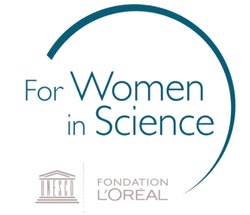L'Oréal and UNESCO have announced the winners of the 2013 L'Oréal-UNESCO Regional Fellowships for Women in Science (FWIS) in Sub-Saharan Africa.
As part of the programme, ten inspiring women scientists from across Sub-Saharan Africa have been honoured for their work in the scientific field and awarded fellowships of €15 000 to put towards their PhD research.
Winners
- Adriana Marais (South Africa)
- Chika Yinka-Banjo (Nigeria)
- Mercy Badu (Ghana)
- Fiona Baine (Uganda)
- Sekai Lana Tombe (Zimbabwe)
- Joyce Mwangama (Tanzania)
- Fortune Somiari Amah-Tariah (Nigeria)
- Aline Saraiva Okello (Mozambique)
- Mpho Ivy Raborife (South Africa)
- Aline Simo (Cameroon)
The scientific research areas being covered by this year's fellows are varied, and include studies in the fields of nanotechnology/materials science, computer science, hydrology, human physiology, chemistry and natural products chemistry, genetics and the relatively new and emerging scientific field of quantum biology.
The L'Oréal-UNESCO Regional Fellowships for Women in Science in sub-Saharan Africa is open to all women scientists up to age 40 across sub-Saharan Africa who are working towards their PhD in all fields of science. It was first piloted in 2010, when five female scientists were awarded fellowships worth €15 000 (Euro) to help them complete their PhD research projects. Following the success of the initial programme, the L'Oréal Foundation doubled the number of fellows to 10 in 2011 - a number that has since been maintained in the programme.
Chief objective
Bertrand de Laleu, L'Oréal South Africa managing director, says the chief objective of the regional fellowship is to increase the participation of women in the field of science. "Women face a number of challenges in this still heavily male-dominated sector. L'Oréal seeks to assist by removing one of these hurdles, which is access to finance.
"Not only is it anticipated that this will increase their active involvement and contribution to the sciences, but it will also enable women to positively impact social and economic progress in various ways, such as through addressing climate change and public health issues, for example. We believe the women we assist have the potential to make great strides in the field of science; in fact, two of the beneficiaries of our global programme have gone on to win Nobel prizes," he says.
De Laleu adds that the programme is starting to make its presence felt within the African scientific fraternity.
A stronger footprint
"This year we received 158 applications from all over sub-Saharan Africa, with our ten fellows coming from Nigeria, Ghana, Uganda, Zimbabwe, Mozambique, Cameroon, Tanzania and South Africa. From this it's evident that the programme has gained a stronger footprint within sub-Saharan Africa, which is most exciting," he adds.
The L'Oréal-UNESCO Regional Fellowships for Women in Science in Sub-Saharan Africa is organised in conjunction with UNESCO's African Network of Scientific and Technological Institutions (ANSTI). Dr Peggy Oti-Boateng, senior programme specialist for Science and Technology, ANSTI coordinator in UNESCO's Nairobi office and one of this year's judges, says it is clear that "the vision of L'Oréal and UNESCO is being realised, as women are venturing into the 'unventurable'."
Regional fellowships such as this one are a natural extension of the international programme, and aim to broaden the reach of the foundation and support even more women in achieving their goals in the world of science. The regional programme for sub-Saharan Africa was officially launched in 2009 in conjunction with ANSTI. A similar programme exists in the Arab States.
The fellowship programme also aims to increase the representation of women in global scientific circles, creating role models for future female generations. In 2009, two previous FWIS laureates were awarded Nobel Prizes in chemistry and medicine, bearing testimony to the impact of the foundation's influence on scientific research.
For more, go to www.forwomeninscience.com
























